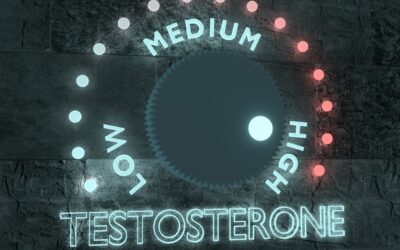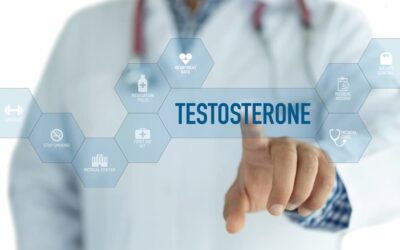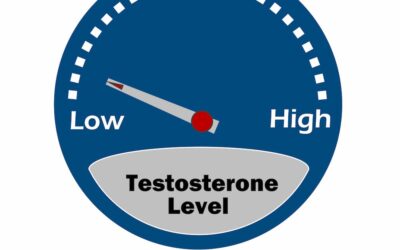Did you know that about 40% of men over the age of 45 have low levels of testosterone? That’s millions of men in the U.S. that are suffering from the symptoms of low testosterone, dealing with frustrating side effects like chronic exhaustion, low sex drive, erectile dysfunction, and weight gain.
Here’s an even more surprising fact: so many of these men have been told that feeling tired, emotionally drained, and irritable are just a fact of life in middle age. And still, others are completely unaware that there’s a safe, effective treatment readily available, one that could resolve their symptoms and restore the sense of wellness they had in their 20s and 30s.
Testosterone replacement therapy (TRT) is a proven treatment for testosterone deficiency, a condition often referred to as “low-T.” Testosterone therapy is recommended by a wide range of health professionals and experts and is outlined as a viable treatment option for hypogonadism/testosterone deficiency in the latest guidelines published by The Endocrine Society. As TRT becomes increasingly accessible for men throughout the country and the world, it’s become a total game-changer for men’s health and wellness.
The Role of Testosterone in Men’s Health
Before the positive effects of TRT can be truly appreciated, it’s important to understand just how critical part testosterone plays in the male body.
What is testosterone and why does it matter?
Testosterone is the primary sex hormone in men and is responsible for many aspects of physical, sexual, and mental health. In women’s bodies, small amounts of testosterone are produced, but it’s typically associated with men’s health.
For men, testosterone impacts your well-being on virtually every level, including:
-
- Sex drive and performance
- Bodyweight and fat distribution
- Bone density
- Muscle mass
- Red blood cell production
- Energy levels
- Facial and body hair growth
- Sperm production
- Moods/emotions
The onset – and the detrimental effects – of low-T
Produced in the testes, testosterone generally reaches peak levels of production in your late 20s. Then, around the time you hit 30, your levels start to decrease about 1% every year. Even though this is “normal,” what’s not necessarily normal is assuming that you have to settle for a subpar quality of life as a result.
All men are different, which means that there isn’t a specific number that equates to the perfect amount of testosterone. Instead, healthy testosterone levels can range from 300 to 1,000 nanograms per deciliter of blood. So, some men might reach low-T levels in their early 40s, while others may not get there until their 60s – it can largely depend on the amount of testosterone production you’re starting with, as well as other factors.
Once your levels drop under 300 or so, the side effects will absolutely be noticeable. For many men, low-T manifests as a sense that something is “off” in their bodies. For others, an unpleasant assortment of confusing symptoms starts to set in at a fast and furious rate. Again, every case is unique (which is what makes it so important to see a healthcare professional if you think you might have low-T).
Some of the most common signs of a testosterone deficiency are:
-
- Erectile dysfunction (ED)
- Less interest in sex
- Accumulation of body fat, especially in the gut area
- Weight gain
- Thinning hair or patchy facial hair
- Irritability and mood swings
- Difficulty concentrating
- Constantly feeling drained
- Sleep problems
- Anxiety or depression
- Muscle loss
Almost no part of your life is off-limits to low-T, making it one of the most destructive health issues a man can face. But if you’re experiencing any of these symptoms, you aren’t alone – and you don’t have to continue suffering.
A Life-Changing Solution to Low Testosterone Levels
Here at Ehormones MD, our low-T doctors are firsthand witnesses to the exceptional benefits of testosterone therapy for men. Every day, we have patients achieving goals they never imagined were within reach, reclaiming their lives, and returning to the best versions of themselves.
We’ve heard stories about relationships that were saved by restored intimacy, men that regained the energy to pursue passion projects and new hobbies, and many health complications improved or eliminated entirely. So many men describe the new lease on life they are given as a result of TRT, and their newfound excitement for the years that lay ahead.
But beyond the “big picture” of an improved quality of life, the benefits of TRT are equally impressive when you look closer at the specific effects of therapy:
-
- More energy
- The ability to lose stubborn weight/fat
- Increased strength and stamina
- Improved sex drive
- Resolution of erectile dysfunction (ED)
- More positive moods
- Better concentration and focus
TRT benefits often create a domino effect that can totally transform an individual’s health. For example, because low-T can cause weight gain, it can lead to an increased risk of diabetes, heart disease, and obesity. But when testosterone therapy empowers a man to achieve a healthier weight and lose extra fat, he can significantly reduce future health problems.
In fact, when you zoom out to the long-term effects of TRT, it’s not an exaggeration to say that it could be a potentially life-saving treatment in more ways than one.
How to get diagnosed with low-T
One of the biggest obstacles for TRT providers is helping men understand when to pursue a possible low-T diagnosis. Because the signs of low testosterone are so commonly misunderstood as a normal part of aging, many men never get diagnosed. Plus, because testosterone deficiency is sometimes considered an off-limits subject, it’s not unusual for men to never even consider how low-T could affect them.
If you have even one of the symptoms of low levels of testosterone, it’s recommended that you talk to a hormone doctor like the ones at Ehormones MD. A simple blood test will assess your T levels to determine if you have a deficiency, so there’s virtually no effort and zero pain involved – what do you have to lose?
Completing TRT as part of a comprehensive health strategy
Oftentimes, the best TRT results are those that come from an age management plan that takes all aspects of men’s wellness into consideration. Ideally, TRT won’t be the only strategy used to combat hormonal imbalance but will complement other efforts.
For example, Ehormones MD utilizes patients’ health history, symptoms, hormonal levels, and goals to develop personalized plans that incorporate TRT alongside strategies such as HGH therapy, quality supplements, nutritional and fitness support, and stress management.
Get Your Life Back on Track with TRT from Ehormones MD
Interested in learning more about testosterone therapy? Ehormones MD is here to answer any questions you may have, and our team is happy to help you decide if it’s the right move for you. With dozens of clinics throughout the U.S., there’s an Ehormones MD near you.
For more information about TRT, contact Ehormones MD today.
Image Source: Chaay_Tee / GettyImages





